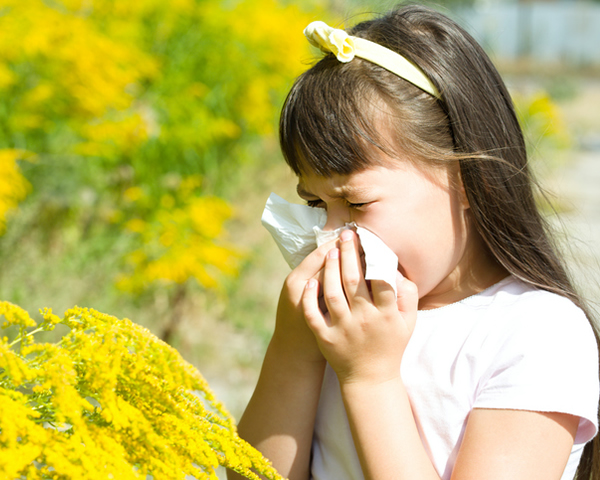Allergies can manifest themselves in many forms in children and unfortunately, allergies are also hereditary in that the tendency to develop them can be passed onto the offspring. It is imperative for parents to identify these allergy problems early and consider preventive measures to optimize the amount of time their kid can spend playing and having fun! Very common symptoms associated with allergy in children are seen in the form of asthma, hives or rashes, coughing, sneezing, itchy eyes, runny nose and upset stomach.
The immune system is responsible for protecting your body from foreign invaders. Sometimes, the immune system is hypersensitive and “overreacts” to a stimulus, which cause a reaction known as an allergy or an anaphylactic reaction.
Food Allergies in Children
Currently, more than 6 million US children identified with a form of food allergy. It is observed that some sensitive babies on breast feeding got allergic reaction through some foods mothers eat. Here, testing babies for allergy and eliminating problem causing food from the diet of mothers can alleviate the issue to a good extent. Egg, peanut and milk or milk products can cause into food allergy in children. So, it is important here to keep off foods those causing allergy as a preventive action.
Nose Allergy
Allergies very commonly result in nasal congestion. Children with nasal congestion tend to breathe through their mouth and this is especially seen while sleeping. This mouth breathing and lacking restful nights can result in negative way over the teeth growth and over the facial bones growth. Addressing nose allergies in the earliest stages is very much essential in order to avoid the mentioned negative impacts.
Eye Allergy
Eye allergy symptoms are seen as redness, itchiness, burning sensation and watery eyes. Outdoor allergens or indoor allergens or irritants may cause into eye allergy in children. Here, eye allergy symptoms share some similarities with some other eye diseases too. So, it is imperative to conduct accurate diagnosis procedure to ascertain the allergy. Utilizing and seeking the right treatment with the help of doctor after the right diagnosis otherwise can lead to severe problems to the eye sight down the line.

Source: Thinkstock/ LyubovKobyakova
Allergy Symptoms
Different varieties of symptoms are seen associated with the different types of allergies in children. These symptoms can expose the allergy type suffered by the child. However, it will be difficult to diagnose allergy based on symptoms, when a child is suffering from more than one allergy. It is commonly allergic symptoms appear at one part of the child body such as sneezing with runny nose or skin problems or breathing issues. Let us see various body parts those can show these symptoms:
- Eyes: The symptoms with eyes are seen as watery eyes, itchiness, redness, swelling, dark areas formation under eye, and some more.
- Nose, Ears and Throat: Blocked nasal area, runny nose, sneezing, itchy nose, headaches, sinuses pain, post nasal drip, lack of smelling, sore throat, swelling in larynx, blocked and glued ear.
- Airways: Breathing difficulty, wheezy breathing, breathing shortness.
- Digestion: Swelling of lips and tongue, itchy tongue or lips, vomiting, sick feeling, diarrhea, constipation, poor growth and reflux.
- Skin: Skin issues like dry or cracked eczema, urticaria like hives, raised itchy areas, and rashes.
Above are the common allergy symptoms and these can appear in various levels of severity. Allergy reactions are very often instant, but some cases will witness delayed reactions too. These symptoms affect digestion, breathing, skin and eyes. Untreated allergies after witnessing the symptoms can lead to serious and severe health issues down the line. Right diagnosis and right treatment is the best way to keep the allergies under control.
How to Prevent Allergies in Children
It should be your first step to see a doctor that is an allergist-immunologist. Your primary care physician can suggest this specialist based on the allergy type and its severity. This allergist will seek complete medical and health history of the family. Symptoms will be evaluated and examined in detail. The type of allergy will be decided through conducting tests on the patient. Here, allergy blood test or skin test will be carried out to find out the root cause of this allergic symptom. Treatment will be carried out by the allergist-immunologist keeping in mind the test results, health history and hereditary record.
As already mentioned, it is good to avoid the allergy of any form through keeping away from the substance that is resulting into this health issue. It is always imperative to observe the symptoms mentioned above to ascertain the allergy in your children. If you suspect the the symptoms your child is experiencing is pertaining to allergies, it is safe to consult your family physician. This will result into primary preventive measure against the allergy problem.
Sourced from: Time
Featured Image: Thinkstock/ Jovanmandic
